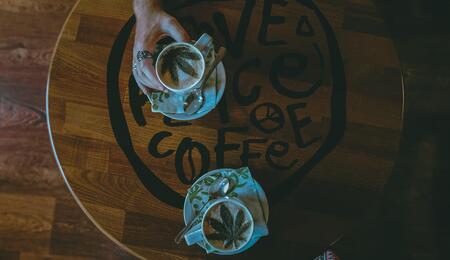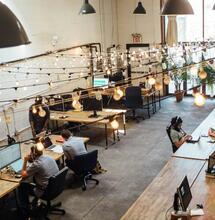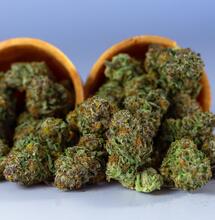Your Morning Joe Influences How Your Body Reacts to Pot

Coffee is a daily ritual beloved by a vast majority of people. We could all use a cup to start the day with. The morning brew helps us open our eyes, get a clear head, and proceed with anything there might be on our list of daily tasks. And what about cannabis?
At the chemical level, coffee and cannabis maintain a highly ‘complicated’ relationship. As it turns out, your morning brew influences how your body wires to weed. According to research, coffee leads to a drop of certain body substances, i.e., metabolites leached from the body’s endocannabinoid system. The endocannabinoid metabolites, which are found throughout our nervous system, immune system, and endocrine tissue, influencing how our body interacts with marijuana, were found to drop after drinking several cups of coffee a day, says the research study recently published in the Journal of Internal Medicine. Endocannabinoid molecules are known to glue with cannabinoid receptors found in the different biological systems of our body. As the body produces its own endocannabinoids, it also responds to imported ones, such as those from inhaling or ingesting weed. While consuming cannabis in any form boosts the level of endocannabinoid compounds, scientific research basically suggests coffee suppresses their number.
Is this of any significance?
It certainly is. Although, researchers are still not entirely clear what their find means. The researchers merely looked at the fluctuations of different chemicals in the blood following coffee consumption. They looked at hundreds of different compounds detectable in our blood vessels, including endocannabinoids. According to Marilyn Cornelis, an assistant professor of preventive medicine at Northwestern University's Feinberg School of Medicine, her team focused on merely five specific biological processes affected by caffeine. Some of these processes included common expected chemical reactions of the body on coffee, i.e., a set of chemical processes known as caffeine metabolism, a common effect of which is dehydration.
According to Cornelis' team, some of the more unique processes were how endocannabinoids clustered following coffee consumption. “What we’re seeing here is that the systems that are impacted by coffee and cannabis overlap,” Cornelis told Live Science at the time. Coffee and cannabis may impact the same body systems, interacting with each other, although the nature of those interactions still needs to be determined. Perhaps it could have some protective function on the body, Cornelis hinted. Intriguingly, the research found, the same endocannabinoids that declined with coffee also dropped when the body underwent stress. For the research purposes, study participants took anywhere between four and eight cups of coffee, potentially stimulating stress on the body.
Mixing coffee and cannabis
While we are not entirely clear on all the interactions happening between coffee and cannabis, nevermind science, the cannabis industry has been flourishing with cannabis-mixing-caffeine products. And people love it. There are concoctions or do-it-yourself caffeine products that contain THC or CBD, the either of the two key compounds derived from the cannabis plant. Beyond dispensaries and online shops, neighborhood coffee shops serving cannabis-spiced coffee on their menu is the new normal everywhere where cannabis has been made legal for recreational use. Cornelis’ research may have looked at what happens at the molecular level with endocannabinoids, but habitual users who opt for caffeinated pot products may be better acquainted with the effects of their purchase. You may have already noticed, had you done it yourself, that cannabis and coffee together has a different effect on the body than taking the two one at a time.
Caffeine, which is praised as a stimulant to energize the body, can electrify dope effects, which in roughly half the people who smoke acts as a stimulant. On the other hand, cannabis can also act as a depressant. Weed is capable of slowing down the brain and relaxing the body, similarly to alcohol, which is a superior depressant. Knowing this, it’s not a ground-breaking theory to conclude that caffeine might cancel out the effects of cannabis or vice versa. Sometimes you smoke so much weed early in the day and take coffee to sober up a little bit. Then, perhaps weed can also help counteract coffee jitters, especially on those days when you’ve overconsumed coffee. On the science side, while some studies suggest that mixing coffee and cannabis may enhance some of the genuine effects of weed, there’s still a lack of sufficient research. Some overall impressions are that low levels of caffeine may enhance your high, potentially downplaying the amount of weed you need in your body. Vice versa, high caffeine levels could downplay your sensation of high, resulting in the need to smoke more weed than you’re supposed to or want to or have to.
CBD coffee
When it comes to THC, users are more likely to stick with smoking a blunt, vaping, or chewing a space cookie to feel the psychedelic effects of the compound. When it comes to CBD, the cannabis compounds with non-psychoactive effects, it’s becoming an increasingly common way to consume it added in coffee. So, over the last few years, CBD coffee has become one of the most unique ways to consume CBD. The combo of the two is supposed to give the alertness of coffee minus the jitters. That CBD coffee is witnessing a boom speaks a long list of CBD coffee brands available on the market. Some of these include the Strava Craft coffee, which has as little as 10 mg of CBD, has two different flavors - milk chocolate and black cherry - and goes as whole bean or ground. Or it could have as much as 25 mg of CBD, such as in the brand Chill CBD coffee, which comes in different flavor pods, including nuts, chocolate and ripe fruit. What may surprise you is that CBD can sometimes be quite stimulating when taken in small doses. It just may be enough to overstimulate some drinkers, giving them the headache, so to speak. Spacing out the doses of CBD coffee, like taking your second cup three to four hours after the first one, may significantly help avoid any unwanted or contra effects such as headaches.
When not to drink CBD coffee?
When it comes to those who seek CBD to treat conditions like anxiety, a cup of CBD coffee might just cause them more damage than helping them out. Caffeine can make anxiety worse, quashing the soothing effects of CBD. Neither is CBD coffee the appropriate way to treat medical issues such as an autoimmune disorder where accurate CBD doses are critical for the compound’s efficacy to alleviate the health condition. When a recent study looked at CBD stability in cannabis tea, it found that temperature affects CBD content, in terms that the milligram amount of CBD someone might need for treating their illness may not be consistent when served in a heated drink. For those not wanting to risk with CBD coffee, consider the various other ways to consume medical cannabis, like vaping or getting some bear gummies. For the healthy person who enjoys a cup of CBD coffee or another brew, it should be no issue, as long as you space out the doses.



